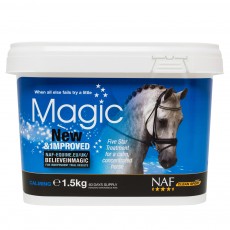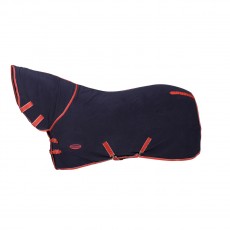Description
- Maintains flexibility of movement in all dogs regardless of age, size and level of exercise.
- Supports the formation of cartilage, tendons, ligaments, synovial fluid and muscles.
- Helps maintain the natural anti-inflammatory actions of the dog's metabolism.
- Provides a unique combination of 32 active nutraceuticals.
- Contains the Oatinol® Delivery System™ to maintain a high rate of nutrient absorption.
- Contains high levels of Omega 3 to support optimum health and performance.
- 100% wheat free.
- A 100% Non GM, soya free formulation.
- Manufactured to Universal Feed Assurance Scheme (UFAS) standards as palatable, easy-to-feed 2mm pellets.
Why Feed Joint Aid
We understand the need for supplying specialist nutracines to help maintain the structure and physiology of the joints and associated bone, cartilage and tendon. Joint degradation can occur due to one of two main reasons; wear and tear can occur simply as a function of age, or it can be caused by mechanical damage due to enhanced activity.
What we are also beginning to understand is what also happens to muscle and merely increasing protein intake is not the most efficient route to supporting muscular activity.
All cells contain protein in some form and the makeup depends on the type of cell. Even muscle cells vary between the types – smooth, cardiac and voluntary – as does the impact of normal processes affect their maintenance. For example, the abrasive effect of food passing along the gut, wearing down the absorptive surfaces, means massive regeneration and the gut wall has the largest need for dietary protein.
The voluntary, or striated, muscles also suffer from high levels of wear. We are probably all aware of the “ratchet” mechanism of muscle contraction, where muscle fibres slide over each over, but it does have certain limitations. Foremost is the conversion of a biochemical process (energy generation in the form of ATP) into a mechanical result, and it is accompanied by the generation of ultrastructural damage and the release of oxidative free radicals.
In line with all metabolic processes there is a balance between anabolism (building) and catabolism (breakdown). Normal levels of activity are within the natural constraints and muscle wear is matched by regeneration.
However, there is a biochemical and physiological process to muscle damage. Muscular activity induces protein breakdown and the release of inflammatory markers and immunomodulatory cues which mop up damaged particles. At the same time, oxidative free radicals and enzymes continue the process of protein breakdown.
Countering this is the process of protein deposition and tissue repair. It is initiated by an increase of vascular activity (blood supply) to the site of damage; not only will this improve the oxygen supply, which is beneficial for energy metabolism especially in slow twitch muscle fibres, but increase the relevant nutrients and metabolites needed for muscle regeneration.
There are two aspects to muscle repair, whilst protein deposition would seem the most obvious, lipid metabolism is essential. Muscle fibres are, in the main, protein strands, but are encased in a protein/lipid complex cell membrane and it is the chemical properties of the both the neutral lipids and the phospholipids that allow the strands to slide over each other; giving rise to contraction.
Both vascular development and cell membrane lipids benefit from Omega-6 and Omega-3 fatty acids. Although Omega-6 is sometimes regarded as being pro-inflammatory (it is actually anti-inflammatory but less so than omega-3), it is also a critical component in improving vascular flow. Omega-3 fatty acids are important in maintaining the neutral and phospho-lipids in the cell membrane.
Following on from the inflammatory phase of muscle degradation – when activity slows or stops – there is a phase of proliferation; proteolysis is reversed and the inflammatory cytokines promote collagen synthesis. This is initiated in the presence of the amino acid leucine, one of the branched amino acids that also include isoleucine and valine, and arginine also aids muscle development and vascular development.
In order to modulate muscle repair – over-proliferation can lead to muscle scarring, which is beneficial in wound healing – it is necessary to limit the pro-inflammatory phase, by promoting anti-inflammation and reducing oxidation. Antioxidant vitamins have been implicated in muscle integrity and tissue repair. Vitamin A improves muscle mass and reduces fat marbling, vitamins B, D, and biotin can help reduce proteolysis and vitamin C has been shown to moderate collagen synthesis.
Vitamin E has long been known as an effective antioxidant, but also reduces those enzymes associated with protein breakdown.
Trace elements are also associated with reduced muscle damage, especially selenium, manganese and magnesium.
Many of the components of Joint Aid will help support normal muscle dynamics. Some anti-inflammatory and antioxidant components are common to both joint and muscle physiology, as are collagen and chondroitin. Although more associated with cartilage metabolism, chondroitin helps modulate tissue regeneration and collagen makes up about 10% of regenerated muscle.
However, positive metabolites will enable a dynamic turnover of muscle metabolism, helping ameliorate the inflammatory phase and regulate proliferation. Specific antioxidants and trace elements have been added and the new product has been formulated to increase its levels of leucine, arginine and the branched chain amino acids.
By introducing these nutrients to the existing nutracines of Joint Aid, there are complementary antioxidant and anti-inflammatory support, beneficial omega-6:3 ratios and an amino acid profile suited to voluntary muscle.
Feeding Guidelines
- Simply mix with your dog’s normal feed.
- Joint Aid can be fed to all dogs regardless of age, size or level of exercise.
- For continued support, Joint Aid for Dogs is recommended to be fed on a daily basis.
- Very digestible 2mm pellets.
- Please store in a cool, dry area away from direct sunlight.
- 1 Measure (Included) = 10gm.
| Size of Dog | Maintenance Level | Full Support Level |
|
Small (up to 15kg) Medium (16 - 30kg) Large (31 - 45kg) X-Large (Over 45kg) |
1/4 Measure (2.5gm) / Day 1/2 Measure (5gm) / Day 1 Measure (10gm) / Day 2 Measures (20gm) / Day |
1/2 Measure (5gm) / Day 1 Measure (10gm) / Day 2 Measures (20gm) / Day 3 Measures (30gm) / Day |
Product Information and Analysis
Manufactured as:
- Very Digestible 2mm Pellets
Available in:
- 250gm Minimum Waste Pouches
- 500gm Minimum Waste Pouch?es
- 2kg Minimum Waste Pouches
Analytical Constituents
- 22.5% Crude Protein
- 8% Crude Fat
- 17.5% Crude Fibre
- 10% Crude Ash
- 20% Starch
- 1.5% Sugar
- 1.6% Calcium
- 0.5% Phosphorus
- 0.2% Sodium
- 0.6% Magnesium
- 4.4% Omega 3 Fatty Acids
Composition
- Black Oats
- Hemp Seed Meal
- Micronized (sugar) Beet Pulp
- Maize Gluten (Prairie) Meal
- Oligosaccharides
- Vegetable Oils & Fats (inc. Oatinol)
- 2.5% Glucosamine (Vegetable Source)
- Magnesium Carbonate
- Calcium Carbonate
- 1% MSM (Methylsulfonymethane)
- 0.8% Hyaluronic Acid (Vegetable Source)
- 0.5% Collagen Matrix
- Calcium Sulphate Anhydrous (Pellet Binder)
- Sodium Chloride
Nutritional Additives
Amino Acids:
- 2.7% Lysine (25gm L-Lysine / L-Lysine Monohydrochloride Technically Pure (3c322))
- 2.15% Leucine
- 1.75% Arginine (5gm Arginine/ L-Arginine (3c362))
- 1% Valine
- 0.75% Isoleucine
Natural Products – Botanically Defined (/kg):
- 3gm Curcuma Longa (2b163-ex)(Turmeric Extract)
- 100mg Pepper Oleoresin (Black Pepper Extract)
Trace Elements (/kg):
- 200mg Manganese (3b507 Dimanganous Chloride Trihydroxide)
- 1mg Selenium (3b815 L-Selenomethionine)
Vitamins (/kg):
- 5000iu Vitamin D3 (3a671)
- 2518mg Vitamin E (3a700 Alpha Tocopherol)
- 1450mg Vitamin C (3a300 Ascorbic Acid)
- 400mg Vitamin B6 (3a831)
- 140mg Betaine (3a925)
- 26mg Folic Acid (3a316)
- 20mg Vitamin A precursor (3a160(a) Beta-Carotene)
- 8mg Biotin (3a880)
- 3mg Vitamin B12 (Cyanocobalamin)
Sensory Additives
Flavour Enhancers (/kg):
- 8.5gm L-Glutamic Acid (2b620)
- 31.8mg Premixture of Sensory Compounds
Technological Additives
Binders & Anti-Caking Agents (/kg):
- 3.8gm Sepiolite (E562)
Returns
In Store & Delivery
In Store (Try On)
Not all items are currently stocked in our Taunton Store. Please call or email us before your visit, so we can request the items from our warehouse, if in stock.
In Store Collection
Local to us? You can also arrange to collect your items. Once you've placed your order, you will be emailed when we have the item(s) ready for collection.
Delivery Services are selected at the Checkout.
Standard Delivery via Parcelforce
Please allow approximately 2-3 working days for dispatch and 2 working days for delivery (total 5 working days). For full details please visit our delivery information page.
In Store Collection
Local to us? You can also arrange to collect your items. Once you've placed your order, you will be emailed when we have the item(s) ready for collection. Delivery Services are selected at the Checkout.
Home Delivery
UK mainland delivery from £6.95
Collect in Store
This item is available for collection.
Hassle Free Returns
For more information please click here.


 In stock
In stock












